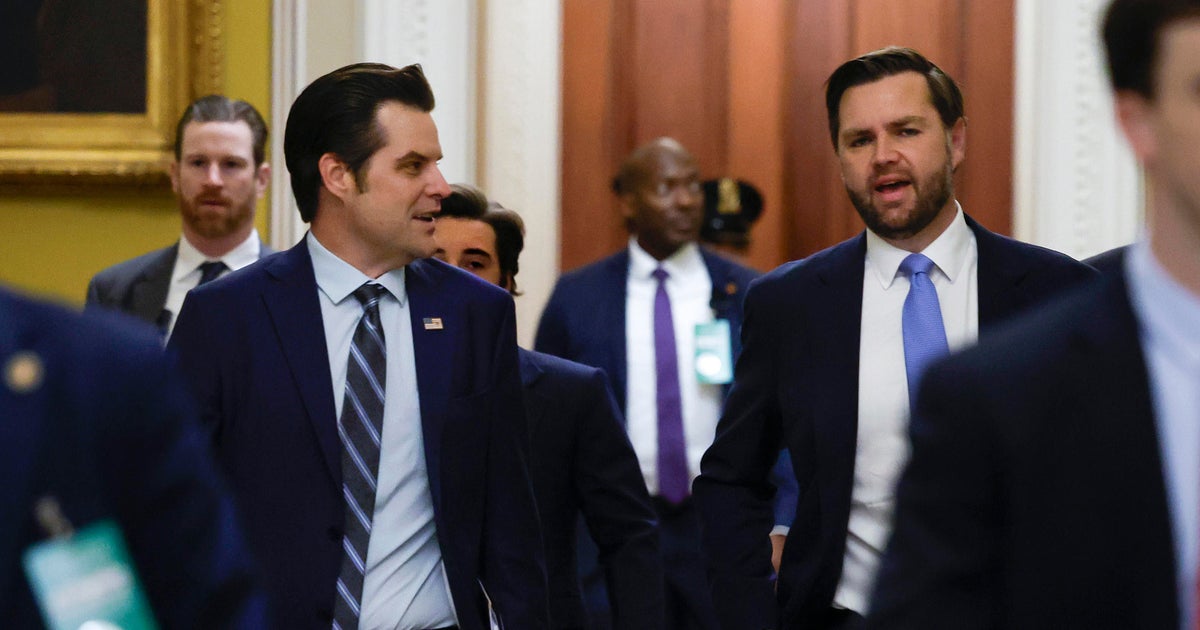Biden huddles with Senate Democrats at Capitol on infrastructure bills
Washington — President Biden visited Capitol Hill on Wednesday for a meeting with Senate Democrats to discuss dual infrastructure proposals wending their way through the Senate, including a $3.5 trillion deal that was announced on Tuesday night.
"We're going to get this done," Mr. Biden said before he entered the luncheon with the Senate Democratic caucus alongside Senate Majority Leader Chuck Schumer.
In a readout of the meeting, the White House said that Mr. Biden "thanked the Senate Democratic Caucus for the groundbreaking work they had done to reach the budget resolution agreement announced last night," and also "touted the benefits of the historic bipartisan infrastructure framework that forms the other half of his domestic economic agenda."
Democratic senators described the mood in the meeting with Mr. Biden as upbeat and encouraging, and said that the president answered several questions. Multiple senators also said that they understood the $3.5 trillion would be spent over ten years.
"Democrats are enthusiastic. This is our chance. This is really going to change the country in a fundamental way," Democratic Senator Sherrod Brown told reporters after the meeting with Mr. Biden. "People who have been screwed by this government and by corporate interests are finally going to see a level playing field."
Schumer had announced after a lengthy meeting on Tuesday that Democrats on the Senate Budget Committee had reached an agreement on the bill. The measure will include Mr. Biden's "human" infrastructure priorities not covered by a bipartisan proposal, such as child care, health care, education and additional provisions related to climate change. Democrats will attempt to pass the measure in the Senate through reconciliation, a process that will allow the legislation to be approved without any Republican votes.
"There is a long road ahead of us. But the fact that we were able to come together last night with diverse views on the budget committee was a strong shot out of the gate," Schumer said in a speech on the Senate floor on Wednesday. The bill will also include an expansion of Medicare benefits to cover dental, hearing and vision, and contain a provision expanding the child tax credits established by the American Rescue Plan.
As this larger bill is unlikely to garner any Republican votes, it must receive support from all 50 Democrats, meaning that it will need support from both ideological ends of the party. Senator Mark Warner, considered the most moderate Democrat on the Budget Committee, backed the $3.5 trillion deal on Tuesday night.
Senator Joe Manchin of West Virginia, the key Democratic swing vote, said he "anxious to review" the proposal, and seemed open to the bill if it is fully funded.
"They worked hard, they should have the proposal, the president is going to come today and explain," Manchin told reporters at the Capitol on Wednesday. "We'll listen to that, we'll look at the proposal, look at the priorities they have for our country, and then basically look at how we're going to pay for it."
The bill must also maintain support from progressives in the party in order to pass, meaning that it is unlikely the price tag can go any lower. Budget Committee Chair Bernie Sanders, who had previously supported a $6 trillion reconciliation bill, threw his support behind the $3.5 trillion deal on Tuesday, calling it "the most significant piece of legislation passed since the Great Depression."
Progressives seemed to fall in line on Wednesday. Senator Ed Markey, who has repeatedly called for any reconciliation bill to have robust climate provisions, told reporters at the Capitol that the bill is "a good start." Senator Elizabeth Warren called it a "strong step forward."
"Would I have liked to get an even larger number? Yes I would, but there are 50 members in the Democratic caucus. We're getting zero support from Republicans," Sanders told reporters. However, he also suggested that progressive priorities on immigration and cutting prescription drug costs would be included in the bill, and said he hoped the House "can even do better" with their own resolution.
Congresswoman Pramila Jayapal, the chair of the Congressional Progressive Caucus, told reporters on Wednesday that she believed her caucus' priorities will be included in the reconciliation deal, which she sees as a "down payment."
According to a senior Democratic aide, the bill would include provisions to meet the president's goals of 80% clean electricity and 50% economy-wide carbon emissions by 2030, and create a Civilian Climate Corps, a priority for Markey. It will also include funding for programs outlined in Mr. Biden's American Families Plan, such as universal prekindergarten, paid family and medical leave, nutritional assistance and affordable housing.
The funding for the bill will come from tax reform, health savings and "long-term economic growth" according to the aide, meaning that the administration and Senate Democrats expect some of the bill to pay for itself. The tax reform aspects are likely to include an increase in taxes for the wealthiest Americans and corporations, while health savings will include cutting prescription drug costs and repealing a Trump-era rebate rule. Mr. Biden had previously floated raising income tax rates for the wealthiest Americans and raising the minimum corporate tax rate as methods to fund large infrastructure spending, but these ideas do not have any Republican support.
In line with Mr. Biden's promises, the bill would prohibit increases on taxes for Americans making under $400,000 per year, small businesses and family farms.
Democrats have a limited amount of time to move forward with this bill and the bipartisan infrastructure proposal before lawmakers leave Washington for the August recess. Democratic senators must complete crafting a budget resolution, which will lay out instructions for passing the bill through reconciliation. Schumer has also said that he would like to bring the bipartisan deal to the Senate floor by the week of July 19, but it's unclear whether the language of the bill will be finalized by then.
It is also unclear how the agreement on the reconciliation bill will affect Republican support for the bipartisan deal. With the $579 billion in new spending included in the bipartisan proposal, total infrastructure spending would be upwards of $4 trillion. Republicans have raised concerns about what they see as excessive spending, and Mr. Biden had to assure GOP negotiators that the bipartisan bill and the reconciliation bill were not linked.
"I think makes it harder, not easier to pass the infrastructure bill," Republican Senator John Thune, the minority whip, told . "It certainly complicates getting to secure Republican votes for the infrastructure bill itself."
But GOP Senator Rob Portman, one of the key negotiators of the bipartisan bill, told reporters on Wednesday that the two bills are unrelated, and Republicans are continuing to work to find agreement on their package.
"I think it's a real mistake what they're doing, but it doesn't affect us at all and we are in a totally separate track," Portman said.
The bipartisan bill will need support from 10 Republicans along with all 50 Democrats to advance, and while 11 Republicans had previously suggested they would vote for the bipartisan proposal, some of them now seem to be getting cold feet. These concerns may be exacerbated by an assessment from the Congressional Budget Office, which is expected to reveal how much the bill will actually cost — and whether the pay-fors suggested by senators would really cover the price.
Jack Turman contributed to this report.





